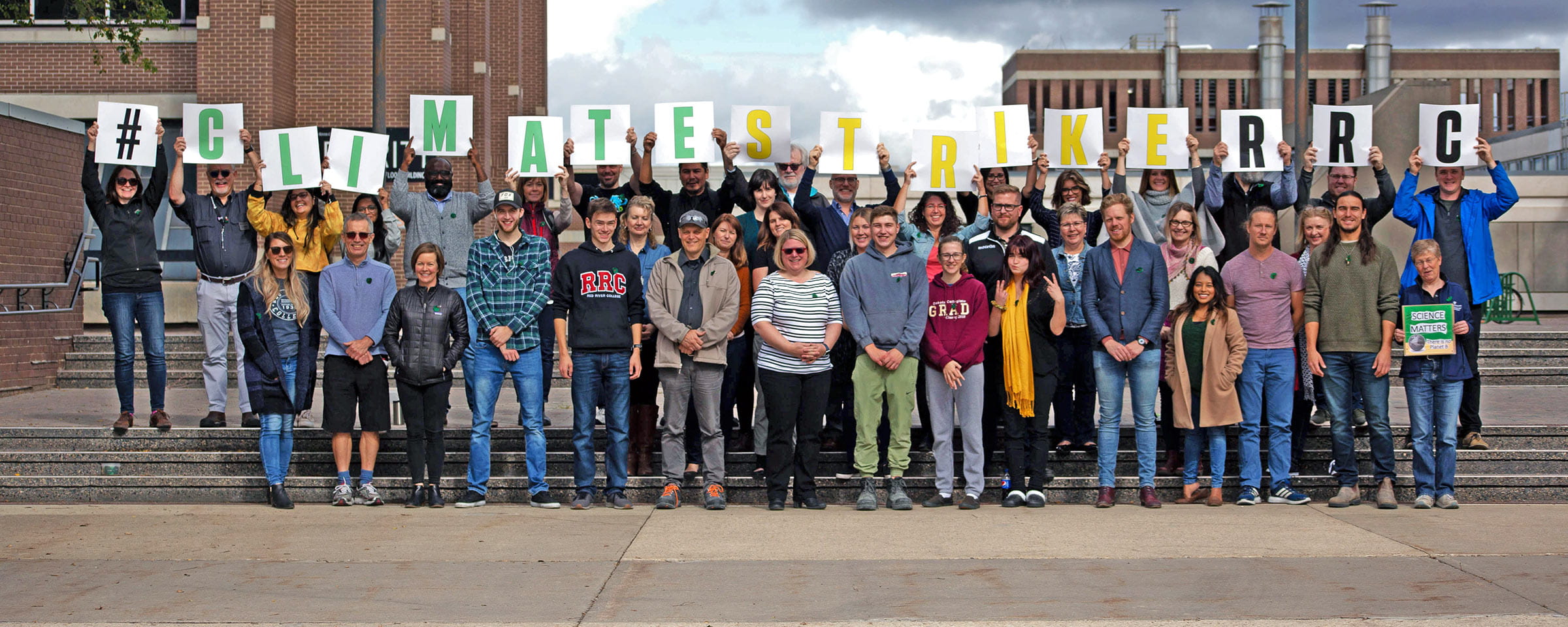Bike Week Inspiration with Breanna Sawatzky!
As you may know, this week is Bike Week, and what better time to dust off that bike and take it for a ride. So, with a ton of great events going on all week, lets get moving!
Not only is biking a great way to reduce your personal carbon emissions, but it has many other benefits on your physical health and mental wellbeing.
 Our office sat down with Breanna Sawatzky, the College’s Mental Health Coordinator to discuss sustainable transportation. Her role consists of many important facets such as drop-in counselling as well as training and education. Below Breanna answers some questions about her experience biking to work, and how it can positively affect your mental health.
Our office sat down with Breanna Sawatzky, the College’s Mental Health Coordinator to discuss sustainable transportation. Her role consists of many important facets such as drop-in counselling as well as training and education. Below Breanna answers some questions about her experience biking to work, and how it can positively affect your mental health.
Q: Tell me about yourself and your transportation strategies in the past?
A: I live in St. James and have a family of four, with one car. In the past, we would convoy together when we all worked downtown. When I started at the college, my husband and I would take turns either busing or taking the car, without really finding a method that worked better than the other. Our home is about 7km away from the campus so in reality it isn’t that far.
Q: What made you consider biking?
A: I felt like I wanted to cycle for the exercise and the sustainability benefits, but I also had some barriers running through my mind for a while. It wasn’t until around this time last year that Commuter Challenge gave me the motivation to actually try it.
Q: What were some of the barriers you had to overcome?
A: One of the main intimidations was the route. The thought of cycling down Route 90 with so many cars travelling at that speed kind of freaked me out a bit. It wasn’t until I typed in my destination to Google Maps and clicked the little bicycle that I realized there was a great route of primarily bike paths that I could take to get to work. Better yet, it would only take me 20 minutes, which was significantly better than the 40-minute bus and much closer to the 10 minutes a drive takes! Another intimidation was the image I had of what a bicyclist was. I had this idea that all bicyclists were super athletic experts and that I would need all the custom attire. I quickly learnt that what you wear and the pace you travel is all about what feels comfortable to you. Accepting the pace that works for me and understanding that you don’t have to be visually or consistently athletic to ride your bike to work. If people pass me, I give them a mental high five and not let it affect my ride or motivation.
Q: Was it inconvenient or a financial burden to take up this new mode of transportation?
A: My husband and I had recently bought each other bikes as an anniversary gift, so building it into one of our traditions made it a bit easier financially. I had a lock and a helmet already but didn’t have any other accessories that I thought I would need when I observed other bikers. When I looked into it a little more I realized I basically had everything that I needed, accept for something to carry my belongings. I didn’t have a backpack suitable for biking and not wanting to spend the money, my husband help me MacGyver my own pannier with the duffle bag I already own and some bungee cords.
Q: Do you use the bike lockers when you bike?
A: I am planning on it once I return to biking as I’m on a bit of a hiatus right now. With or without kids, sometimes there are obstacles that are out of your control and life doesn’t allow this kind of flexibility so it is important to recognize that you don’t have to be an all-or-nothing bicyclist. You can do it when it works for you and if some days it doesn’t, that is ok. Soon I’ll be able to get back to working it into my schedule and when that happens I’ll be sure to grab a locker – and they are free now, so that is nice!
Q: How do you feel sustainable transportation relates to human wellbeing and mental health?
A: Overall, the affordability is huge. If you can reduce the amount of money you spend on transportation you will also be reducing your stress. Students, in particular, report that that finances are one of the biggest stressors. The physical activity itself has been found to be beneficial for mental health as well. Biking to work or school is a way to weave this activity into your day instead of having to put time aside later on. To augment that, this time on a bike or bus can be used to de-stress from the day and allow you that time to yourself.
As you can see, the environmental, financial and health benefits to cycling are plenty. If it’s your first time riding to campus, consider looking for a bike buddy. Check out GoManitoba to plan your route and connect with other cyclists in your area. Once you arrive on campus, keep your bike and gear secure and safe by renting one of our free bike lockers at NDC, or park it in our indoor, secured bike room at PGI. If you are using one of our bike racks, check out these safety tips to lock up properly.
We hope to leave you with some inspiration to get on that bike and give it a try if you haven’t already, and if you have – keep on rollin!
Happy cycling!
